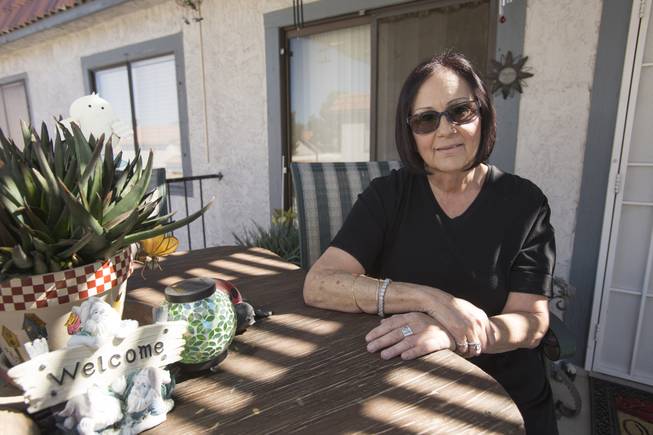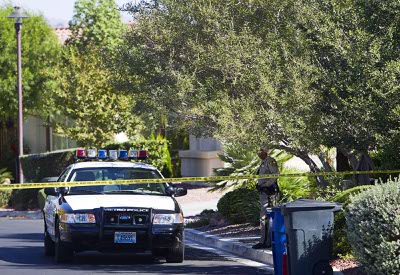
Richard Brian / Special to the Sun
Arlene Alfaro on her balcony Friday, March 13, 2015, in Las Vegas.
Friday, March 13, 2015 | 10:29 a.m.
When Sheriff Joe Lombardo took the helm at Metro Police three months ago, he vowed to bring the agency’s ranks closer to the communities they serve. He would be reorganizing the department, moving dozens of commissioned officers from the agency’s downtown home base into neighborhood substations.
But as Metro leaders seek to fulfill Lombardo's vision for a more accessible police force, the department’s specialized domestic violence unit risks getting lost in the shuffle. Internal documents obtained by the Las Vegas Sun show officials are finalizing a plan to reassign the 14-member team, and that proposal — word of which has spread over the past month — has raised concerns within the department's ranks as well as among domestic violence advocates in Southern Nevada.
"This unit is too important,” said Arlene Alfaro, who bonded with the team after nearly being beaten to death by a former spouse in 2008. “I could feel my jaw drop when I found out. These detectives are like no other detectives.”
Under the tentative plan, the unit’s 12 domestic violence detectives would take on a less specialized role, instead investigating a broad range of criminal cases. The rest of Metro’s detectives, meanwhile, would divide the group’s caseload.
The case for specialists
Experts say domestic violence victims require special attention. They're often skittish, and they tend to protect their attackers. It’s easy for the average officer, handling a litany of other crimes, to miss signs of abuse.
Trained specialists, on the other hand, are generally better equipped and they're closely connected with nonprofit groups who can offer other services like counseling and shelter.
“There are very unique dynamics that specialized individuals or units who obtain these skills understand,” said Lt. Tom Woodmansee of the Madison, Wis., Police Department, who also does research work on specialized units for the U.S. Bureau of Justice Statistics. “In my experience, more and more agencies seem to be adopting domestic violence units.”
Local victim advocacy groups have only heard vague details about Metro’s plans to restructure, and some say they want to be involved in the department’s decision-making process. But while Metro officials shared plans internally about the dismantling of the unit in mid-February, they have not sought public input.
“The organizations in our community should know what’s going on,” said Lisa McAllister, a coordinator for UNLV’s Advocacy, Support, Education, Response Team Against Violence. “We need to know.”
Capt. Shawn Andersen, who is overseeing the reorganization effort, told the Sun today that the agency plans to involve the community in the discussion as early as next week. He said the restructuring plan would begin in mid-July.
“The key to any change is communication, certainly,” Andersen said, declining to discuss project specifics. “Now that we have what we feel like is a reasonable structure of what this generally kind of looks like, then we’ll reach out to those key stakeholders and have a conversation about what our intent is, how they feel about it and what impact they think it has in their area of interest. Then we’ll move forward to make sure that we’re better able to serve them in a decentralized orientation.”
To centralize or not
Law enforcement experts across the nation say the merits of centralized and decentralized police forces are often debated. Some point to the benefits of consolidating police expertise, while others say accessibility is more valuable.
“It’s very appropriate in some places to have this specialist model, while in other places, depending on a department’s size and political situation, then a generalist model might be better,” said Capt. Lon Turner with California’s Chula Vista Police Department, where domestic violence incidents are the town’s second-most common type of crime. To combat the problem, that department last year adopted a model targeting repeat abusers with the help of a federal grant.
“But Metro and Chula Vista are positioned much differently,” Turner said. “There’s a whole host of issues that are different, and what you’re shooting for as a police executive is to meet community standards.”
Metro received about 22,000 domestic violence cases in 2013, according to department statistics. Overall it handled about 59,000 crimes that year.
Agencies with jurisdiction sizes comparable to Metro’s — like the Phoenix, San Diego and Dallas police departments — typically have centralized domestic violence units.
Bigger forces, like the New York and Los Angeles police departments, usually have enough resources to distribute specialists among outlying substations. Some smaller organizations like the San Antonio Police Department mimic that model.
Whether Metro has enough resources to follow suit is a matter of great debate.
Changes at Metro
Lombardo’s move to decentralize was a stark deviation from the strategy of predecessor Doug Gillespie, who just four years ago oversaw the adoption of a gleaming $200 million, three-building home base in an effort to consolidate the department into a single central location.
The abrupt shift has frustrated many Metro detectives whose jobs may be affected.
“There’s no question that most of the detectives who are being displaced from their current working location into one of the substations do not believe that this is going to make their job any easier or that they’ll be able to perform any better,” said Chris Collins, who heads Metro’s bargaining union. “I think they’re going to say that’s going to really limit their abilities to dive into big cases.”
Still, the proposed deal has some support among the community.
Former Sheriff Bill Young lauded Lombardo’s efforts to entrench employees in neighborhoods across the valley. He said it makes sense for officers to be face-to-face with the communities they serve.
Annette Scott, who heads community outreach efforts for the nonprofit victim relief group Safe House, said she’s optimistic the changes will bolster Metro’s ability to handle domestic violence cases.
“I’m just going to have faith,” Scott said. “Their job is to protect the community, and I have to believe that they’re going to do that.”
One Metro employee who spoke with the Sun on the condition of anonymity isn’t convinced.
“It’s insane,” the employee said. “In a department with a population of 2 million people, domestic violence is getting pushed to the side.”


Join the Discussion:
Check this out for a full explanation of our conversion to the LiveFyre commenting system and instructions on how to sign up for an account.
Full comments policy